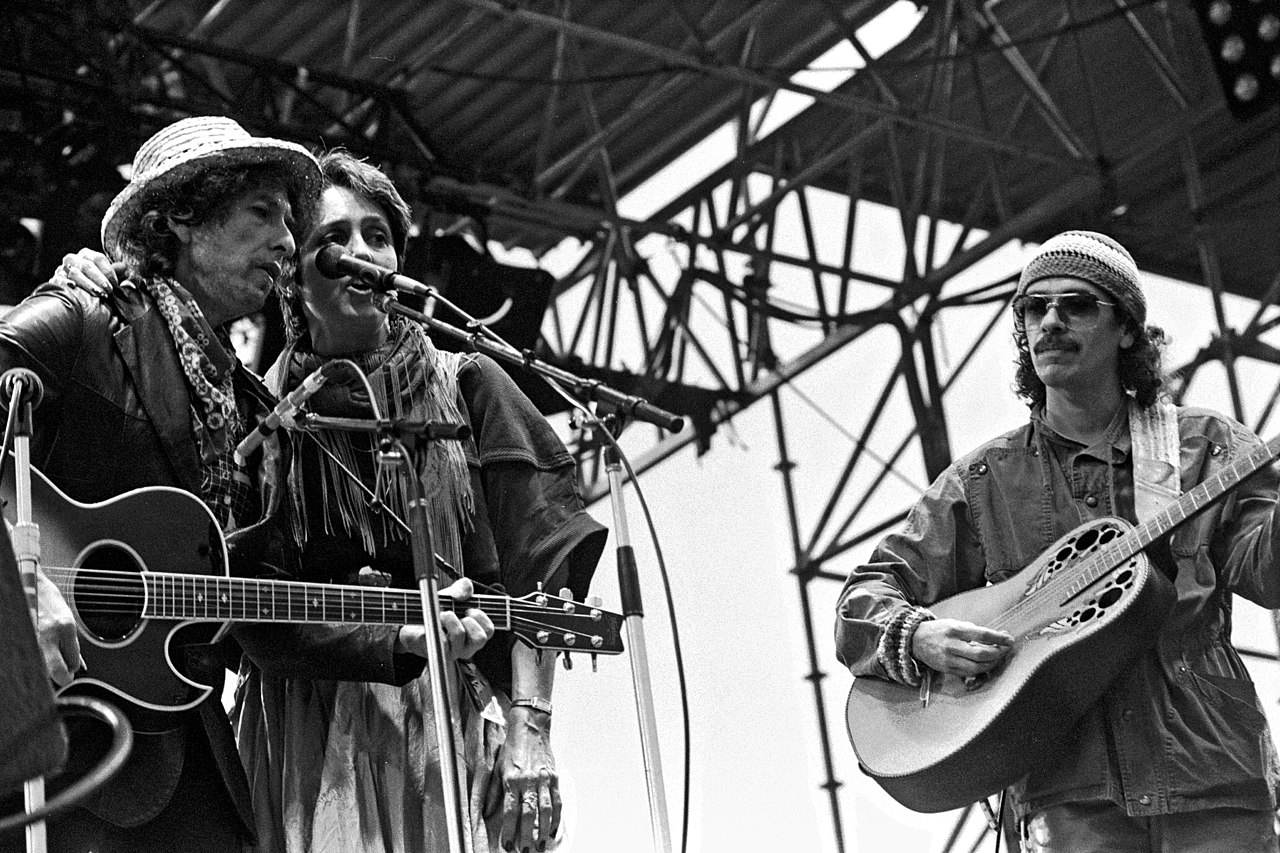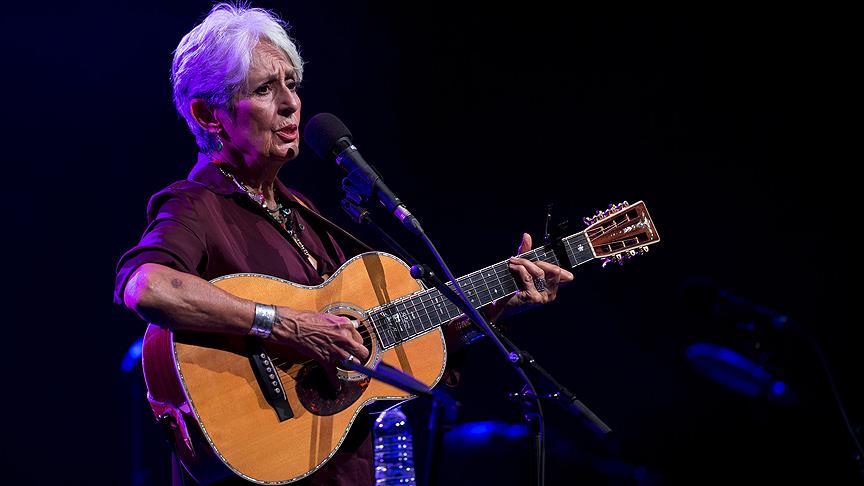Joan Baez
Joan Baez

Joan Chandos Baez, born on January 9, 1941, is an American singer, songwriter, musician, and activist known for her contemporary folk music, which often includes songs of protest and social justice. Over her more than 60-year career, she has released more than 30 albums.
While Baez is generally regarded as a folk singer, her music has diversified over the years, incorporating genres such as folk rock, pop, country, and gospel music. She began her recording career in 1960 with immediate success. Her first three albums, "Joan Baez," "Joan Baez, Vol. 2," and "Joan Baez in Concert," all achieved gold record status. Although she is a songwriter herself, Baez is known for interpreting other composers' work. She has recorded songs by a diverse range of artists, including the Allman Brothers Band, the Beatles, Leonard Cohen, Bob Dylan, and many others. Her early recordings of Dylan's songs helped popularize his work.
Some of Baez's acclaimed songs include "Diamonds & Rust," covers of Phil Ochs's "There but for Fortune" and The Band's "The Night They Drove Old Dixie Down," as well as originals like "Farewell, Angelina," "Love Is Just a Four-Letter Word," and "Sweet Sir Galahad." She performed fourteen songs at the 1969 Woodstock Festival and has maintained a lifelong commitment to political and social activism, particularly in the areas of nonviolence, civil rights, human rights, and the environment.
In recognition of her contributions to music and activism, Baez was inducted into the Rock and Roll Hall of Fame on April 7, 2017.
Joan Chandos Baez was born on January 9, 1941, in the Staten Island borough of New York City. Her family background was diverse, with her grandfather leaving the Catholic Church to become a Methodist minister, and her father, Albert Baez, being born in Puebla, Mexico, before pursuing a career in mathematics and physics. Her mother, Joan Chandos Baez (née Bridge), hailed from Edinburgh, Scotland. Baez had two sisters, Pauline Thalia Baez Bryan and Margarita Mimi Baez Fariña, both of whom were political activists and musicians.
Raised in a Quaker household, Baez was influenced by her family's commitment to pacifism and social justice. She experienced discrimination due to her Mexican heritage and became involved in social causes early in her career, including civil rights and nonviolence. Her family's international lifestyle, driven by her father's work with UNESCO, exposed her to various cultures and social issues, including living in places like the San Francisco Bay area, where she graduated from Palo Alto High School in 1958.
Throughout her life, Baez has remained connected to her roots, residing in Woodside, California, where she lived with her mother until her passing in 2013. She has emphasized her affinity for nature, often spending time meditating and writing in a backyard tree house. Baez maintained close relationships with her sisters, particularly her younger sister Mimi, until her death in 2001.
In her later years, Baez has focused on portraiture, stepping back from the stage. She has clarified misconceptions about her, stating that she has never been part of the feminist movement and is not a vegetarian. Despite false assumptions, Baez's dedication to social activism and her timeless music legacy continue to inspire many.

Joan Baez's memoir, "And a Voice to Sing With," begins with the poignant assertion, "I was born gifted," referring to her exceptional singing voice, which she attributes to a divine endowment rather than personal merit. This sentiment underscores her humility and reverence for her musical talent.
Despite her innate gift, Baez's journey with music started modestly when a friend of her father gave her a ukulele, igniting her passion for rhythm and blues. Despite her budding interest, her parents harbored concerns that her musical pursuits might expose her to the perils of drug addiction. However, at the age of 13, a pivotal moment occurred when her aunt took her to a concert by folk musician Pete Seeger. This experience deeply resonated with Baez, inspiring her to immerse herself in Seeger's repertoire and eventually perform his songs publicly.
Baez's earliest public performance took place at a retreat in Saratoga, California, for a youth group associated with Temple Beth Jacob, a Jewish congregation in Redwood City, California. This marked the beginning of her journey as a performer, setting the stage for her future as a prominent figure in the folk music scene. In 1957, Baez furthered her musical pursuits by purchasing her first Gibson acoustic guitar, symbolizing her growing dedication to her craft.
In 1958, after graduating from high school, Joan Baez's family relocated from the San Francisco area to Boston, Massachusetts, where her father accepted a faculty position at MIT. Boston was burgeoning with folk music activity at the time, and Baez swiftly immersed herself in the local scene, performing in venues around Boston and nearby Cambridge. Despite briefly attending Boston University for about six weeks, her passion for music took precedence, and she began making a name for herself in the local folk circuit.
At the renowned Club 47 in Cambridge, Baez held her debut concert in 1958. Contemplating a stage name change, she considered options like "Rachel Sandperl" after her mentor Ira Sandperl, or "Maria" from the song "They Call the Wind Maria." Ultimately, she retained her birth name, wary of potential misinterpretations related to her Spanish surname. Her inaugural performance attracted a modest audience consisting of family, friends, and her boyfriend, totaling only eight attendees. Despite the small turnout, she was paid ten dollars and was soon invited back to perform regularly, twice a week, for $25 per show.
Shortly thereafter, Baez collaborated with two fellow folk enthusiasts to record an album in a friend's cellar. Released on Veritas Records in the same year under the title "Folksingers 'Round Harvard Square," the album featured solo and duet performances. This endeavor marked her initial foray into recording and showcased her burgeoning talent as a folk singer.
Baez's path intersected with prominent figures in the folk music scene, including Bob Gibson and Odetta, who greatly influenced her musical style. Following a successful performance with Gibson at the 1959 Newport Folk Festival, where they captivated audiences with their duets, Baez's reputation as a remarkable folk vocalist soared. This appearance caught the attention of Vanguard Records, who promptly signed her, offering her the artistic freedom she desired. Despite interest from Columbia Records, Baez opted for Vanguard, perceiving it as a more conducive environment for her creative expression.
Recognized for her ethereal voice, flowing hair, and natural beauty, Baez earned the nickname "Madonna" during this period, symbolizing her serene and maternal presence on stage. This moniker underscored her emerging status as an iconic figure in the folk music community.
References
- Baez, Joan (2009), And A Voice to Sing With: A Memoir, New York City: Simon & Schuster, p. 61, I gave Time a long-winded explanation of the pronunciation of my name which came out wrong, was printed wrong in Time magazine, and has been pronounced wrong ever since. It's not "Buy-ezz"; it's more like "Bize," but never mind.
- ^ Wells, J. C. (2000). "Baez 'baɪez; baɪ'ez —but the singer Joan Baez prefers baɪz". Longman Pronunciation Dictionary. Harlow, England: Pearson Education Ltd.
- ^ "UPI Almanac for Thursday, Jan. 9, 2020". United Press International. January 9, 2020. Archived from the original on January 15, 2020. Retrieved January 16, 2020. …singer Joan Baez in 1941 (age 79)
- ^ Westmoreland-White, Michael L. (February 23, 2003). "Joan Baez: Nonviolence, Folk Music, and Spirituality". Every Church A Peace Church. Archived from the original on July 22, 2004. Retrieved November 3, 2013.
- ^ Jackson, Ernie. "Folk Guitarists". Joelma The Everything Guitar Book Joelma. F+W Publications Inc., 2007. Print.
- ^ Ruhlemann, William (May 6, 2009). "Joan Baez – Biography". AllMusic. Archived from the original on December 6, 2013. Retrieved December 13, 2009.
- ^ Hansen, Liane (September 7, 2008). "Joan Baez: Playing For 'Tomorrow'". NPR. Archived from the original on September 16, 2017. Retrieved September 15, 2017. Reinterpreting other musicians' songs is nothing new to Baez, who says she considers herself more an interpreter than a songwriter.
- ^ Howell, Peter (2009). "Joan Baez gets her apology". Toronto Star. Archived from the original on January 1, 2016. Retrieved January 9, 2016












































